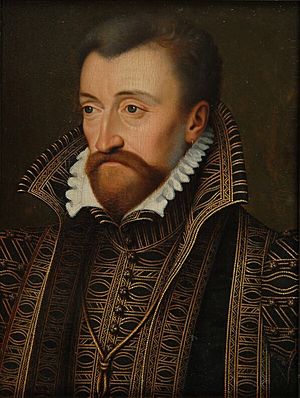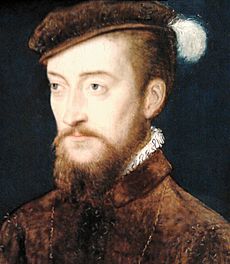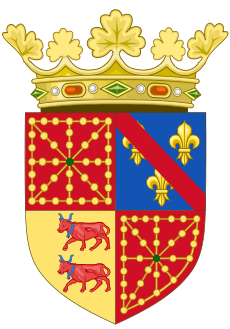Antoine of Navarre facts for kids
Quick facts for kids Antoine |
|||||
|---|---|---|---|---|---|

Portrait by François Clouet (1557)
|
|||||
| King of Navarre (jure uxoris) | |||||
| Reign | 25 May 1555 – 17 November 1562 | ||||
| Predecessor | Henry II | ||||
| Successor | Jeanne III | ||||
| Co-monarch | Jeanne III | ||||
| Born | 22 April 1518 La Fère, Picardy, France |
||||
| Died | 17 November 1562 (aged 44) Les Andelys, Eure |
||||
| Burial | Vendôme | ||||
| Spouse | |||||
| Issue among others... |
|||||
|
|||||
| House | Bourbon | ||||
| Father | Charles, Duke of Vendôme | ||||
| Mother | Françoise of Alençon | ||||
| Religion | See details | ||||
Antoine de Bourbon, King of Navarre (born April 22, 1518 – died November 17, 1562) was the King of Navarre. He became king in 1555 because he was married to Queen Jeanne III. He was the first ruler from the important House of Bourbon family.
Even though he was a very important prince, he didn't have much power compared to King Henry II's favorite advisors, the Montmorency and Guise families. After King Henry died in 1559, Antoine lost influence in the government, which was controlled by the Guise family. His brother's actions also caused him trouble. When King Francis II died, Antoine became a main commander of France. He led the royal army in the first of the French Wars of Religion. He died from injuries he got during a battle called the Siege of Rouen. Antoine was the father of Henry IV of France, who later became a famous King of France.
Contents
Antoine's Early Life
Antoine was born in La Fère, a town in Picardy, France. His father was Charles de Bourbon, Duke of Vendôme, and his mother was Françoise d'Alençon. Antoine was the second son in his family.
He had a younger brother named Louis, Prince of Condé (1530–1569). Louis later became a leader of the Huguenots, who were French Protestants, during the French Wars of Religion.
Antoine's Role During the Reigns of Henri II and Francis II
King Henri II's Time
Antoine faced some challenges at the court of King Henri II. This was because his family had lost some favor after his relative, Charles III, Duke of Bourbon, sided with Charles V in 1523. Despite this, Antoine became King of Navarre in 1555 through his marriage.
In 1555, Antoine lost his important job as governor of Picardy, a border region. This job was given to Admiral Coligny, which made Antoine upset. To make up for it, he was given the rich governorship of Guyenne in the south.
Antoine showed early interest in the Protestant Reformation. He wrote to a pastor from Geneva in 1557. He also protected the Huguenot church in Guyenne in 1558. In the same year, he attended a public psalm singing event, which made King Henri very angry. Antoine also fought for the French crown in the final part of the Italian Wars in 1558. Protestant leaders like Calvin and Beza tried hard to get Antoine to join their side.
King Francis II's Time
When King Henri II died in 1559, the Guise family took control of the government. Many people who didn't like the Guise family hoped Antoine would take charge. However, the Guise family kept him from gaining power. They gave him the governorship of Poitou and sent him away to escort Elisabeth of Valois to Spain.
In 1560, some people planned a rebellion called the Amboise conspiracy against the Guise government. They wanted Antoine to be their leader, but he wasn't interested. After this plot failed, unrest continued in southern France. Antoine's brother, Condé, was involved in plans for an uprising in Lyon.
The Guise family found out about Condé's plans. Both Antoine and Condé were called to court in August for an important meeting. They were the only important nobles who didn't go. The Guise family tried to weaken the Bourbon family's power. They created new large governorships and gave them to their own relatives. This separated the Bourbon princes from each other. The Guise family warned Antoine that they had a large army ready to move into the south. Antoine and Condé had fewer soldiers, so they had to go north without a fight. When they arrived, Condé was arrested and sentenced.
Antoine's Role During the Reign of Charles IX
Death of Francis II
In December 1560, the young King Francis II died. His brother, Charles IX, became the new king. Charles was too young to rule alone, so he needed someone to rule for him, called a regent. As the most important prince, Antoine had a right to be regent.
However, Catherine de' Medici, the queen mother, had a lot of power over Antoine. This was because his brother Louis was still in prison for treason. Antoine and Catherine made a deal. Catherine would be the regent, and Antoine would become the Lieutenant General of the kingdom, meaning he would be the main commander of the army. Also, Condé would be set free and brought back into favor.
The Start of Civil War
Antoine found himself disagreeing more and more with Catherine's religious policies. He finally broke with her over a law called the Edict of Saint-Germain. He urgently asked the Duke of Guise to return to court so they could stand together against this law.
On his way to Paris, the Duke of Guise's men caused the Massacre of Vassy. This event started the civil war in France. Antoine, as Lieutenant General, became the supreme commander of the king's forces in this conflict.
The First French War of Religion
In May, Antoine ordered all Protestants to leave Paris, which pleased many people in the capital. In June, his army and Condé's army faced each other near Orléans. However, there were only small fights as they continued to negotiate to avoid a major battle.
As Condé's forces retreated, Antoine and other leaders began to retake towns held by the rebels, including Blois, Tours, and Amboise. In August, Antoine's main royal army successfully attacked and captured the important town of Bourges from the rebels. When his wife, Jeanne d'Albret, allowed the Huguenots to damage churches in Vendôme, Antoine threatened to send her away.
After taking Bourges, the royal army had a choice: march directly on Orléans, the Huguenot capital, or first attack the northern town of Rouen. Antoine wanted to go straight to Orléans. However, there was a plague in Orléans, and the English were a threat. Also, Catherine hoped Antoine could convince his brother to stop rebelling. So, the court decided against attacking Orléans first.
Antoine's army began to attack the city of Rouen on September 28. On October 13, while checking the siege trenches, Antoine was badly wounded by a musket shot to his shoulder. Despite the efforts of a famous surgeon, he could not be saved. Antoine died from his wounds on November 17. It was rumored that he received his last religious rites in the Lutheran way, which added to long-held beliefs that his religious views were not traditional.
Antoine's Marriage and Children

On October 20, 1548, in Moulins, Antoine married Jeanne d'Albret. She was the daughter of Henry II of Navarre and Marguerite de Navarre. After his father-in-law died in May 1555, Antoine became King of Navarre. He also became Count of Foix, Bigorre, Armagnac, and Périgord, and Viscount of Béarn.
It was said that Jeanne was very much in love with Antoine. Later, Antoine returned to the Catholic faith, which caused problems with his wife. He even threatened to divorce her.
Antoine and Jeanne had several children:
- Henry (1551–1553), Duke of Beaumont
- Henry IV of France (1553–1610)
- Louis (1555–1557), Count of Marle
- Madeleine (1556–1556)
- Catherine (1559–1604), who married Henry II, Duke of Lorraine in 1599
Antoine also had a son with his mistress, Louise de La Béraudière de l'Isle Rouhet:
- Charles, who became the Archbishop of Rouen from 1554 to 1610.
Images for kids
See also
 In Spanish: Antonio de Borbón para niños
In Spanish: Antonio de Borbón para niños
 | Jessica Watkins |
 | Robert Henry Lawrence Jr. |
 | Mae Jemison |
 | Sian Proctor |
 | Guion Bluford |





